Risk and Strength
Ironically—just as in the investment world—the willingness to tolerate a reasonable amount of risk actually reduces overall systemic risk in a society, because the assets of the society become diversified, more robust. The existence of a powerful military force—and the will to employ it—means that the society is less likely to be attacked, not more likely. Exposing a society's business enterprises to foreign competition means that, overall, those enterprises will be stronger, not weaker. The knowledge that we can be fired for incompetence or indolence makes for better, not worse, employees. Thus it is that risk-averse societies are more risky overall than non-risk-averse societies, in precisely the same sense that risk-averse investors end up holding portfolios that are more risky than those of non-risk-averse investors.
Of course, there is no gainsaying that costs are paid by societies that expose themselves to risk. In my own city of Pittsburgh, years of inefficient management, obsolete plants, and a legacy of powerful, militant, and unaccountable unions destroyed the Pittsburgh steel industry in one generation. A city that, during World War II, produced more steel than all of Germany and Japan combined produces, today, not one ton of steel. In barely more than a decade, nearly 100,000 steelworkers lost their jobs. These were men (almost all were, in fact, men) wholly unsuited by training or culture for any other remotely equal employment. Thousands of businesses that relied on the steel industry also collapsed. The pain caused by this dislocation can hardly be overestimated. But the consequences for American competitiveness of propping up the Pittsburgh steel industry—by, for example, imposing high tariffs on imported steel13—would have been far worse.
In a very important sense, risk-averse societies—providential societies—are opposed to the idea of progress itself. In effect, these societies are saying, “I am now rich and comfortable enough that further progress is unnecessary, because it brings risks, and to hell with the consequences for others of this attitude.” As noted above, we needn't look far to observe this phenomenon in full flower in much of Western Europe and Scandinavia.
It is important to keep firmly in mind that it is not that Europe lacks the inherent capability to build a strong military force or to create a more vigorous economy. The European Union encompasses 27 nations and is the single richest and largest organized bloc of nations in the world. The Union's population is, in the aggregate, nearly 200 million people larger than that of the United States.14 What so many in Europe (and elsewhere) lack is the will to do those things.
One hundred and forty years ago, Abraham Lincoln understood this point quite precisely. Speaking at the great cemetery at Gettysburg, a place as haunting today as it was in 1864, Lincoln articulated the reason why the United States would not allow democracy to die. It was not because the United States had the military power to enforce its wishes against the Confederacy—in 1864 that was still very much unclear. Nor was it that the United States possessed the industrial might to dominate the Confederacy. Nor was it, even, that God was on the side of the North. The United States would not allow democracy to die simply because we willed it to remain alive. Democracy would prevail as the result of a collective act of American resolve: “We here highly resolve … that government of the people, by the people, and for the people shall not perish from the Earth.”15 Nearly a century and a half later, Lincoln would still recognize, in an America otherwise formidably changed, the collective American resolve to preserve democracy, a resolute will that is determined to prevail despite almost unanimous opposition from our friends and our foes alike.16
